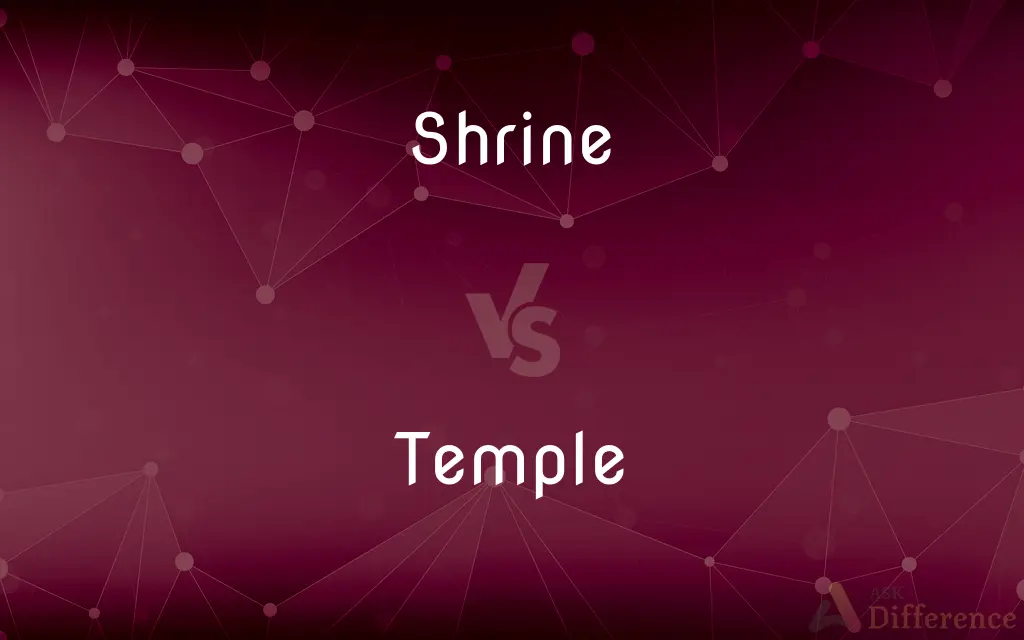Shrine vs. Temple — What's the Difference?
By Tayyaba Rehman & Urooj Arif — Updated on March 13, 2024
A shrine is a sacred place dedicated to a specific deity, person, or event, focusing on personal devotion; temples are larger, community-oriented places of worship for multiple deities.

Difference Between Shrine and Temple
Table of Contents
ADVERTISEMENT
Key Differences
Shrines are often smaller, more intimate spaces dedicated to a specific deity, saint, or sacred occurrence, allowing for personal acts of devotion such as prayers, offerings, or meditations. Whereas temples are larger structures designed for communal worship and ceremonies, often serving as the central place of worship within a community.
Shrine can be found within homes, by roadsides, or in natural settings. Temples typically host rituals, festivals, and serve multiple deities or a major deity in a religion.
Shrines usually do not have full-time clergy and might not host regular congregational services, making them more accessible for personal, unscheduled visits for reflection and offering. On the other hand, temples often have a structured hierarchy and clergy responsible for performing rituals, maintaining the temple, and guiding the community in religious practices.
The focus of a shrine is on the individual's connection and devotion to the divine or sacred memory it commemorates, providing a personal space for reflection and solace. Temples, by contrast, emphasize the collective aspect of worship, bringing together members of a faith for shared rituals, teachings, and fostering a sense of community and belonging.
Comparison Chart
Primary Function
Personal devotion to a specific deity, person, or event
Communal worship, rituals, and ceremonies
ADVERTISEMENT
Scale and Location
Smaller, can be located anywhere
Larger, often central in a community
Clergy and Services
Usually none; focused on personal visits
Structured clergy; regular services and festivals
Worship Focus
Individual connection and reflection
Collective religious practices and community building
Examples
A roadside shrine dedicated to a patron saint
Hindu temple complex with multiple deities
Compare with Definitions
Shrine
A site of worship that is often personal or commemorative.
The family maintained a shrine at the site of their ancestor’s burial.
Temple
Serves as a communal gathering place for rituals and ceremonies.
The community gathers at the temple for the annual festival.
Shrine
May contain relics, symbols, or images of the revered figure.
The shrine housed a relic believed to have miraculous powers.
Temple
A building dedicated to religious worship or activities, often for multiple deities.
The ancient temple is a major pilgrimage site for believers from around the world.
Shrine
Can be a natural site or constructed space regarded with reverence.
A shrine at the base of the mountain is believed to protect climbers.
Temple
Often has a structured hierarchy and clergy responsible for rituals.
Priests at the temple perform daily rites to honor the deities.
Shrine
A holy or sacred place dedicated to a specific deity, person, or event.
A small shrine in her home holds candles and pictures of the patron saint.
Temple
Can be an architectural landmark and symbol of cultural identity.
The temple’s unique architecture draws visitors from all over the globe.
Shrine
Serves as a place for individual prayer, offerings, or meditation.
Visitors leave offerings at the shrine to seek blessings for their journey.
Temple
Facilitates teachings, spiritual education, and community services.
The temple offers classes on scripture and meditation for all ages.
Shrine
A shrine (Latin: scrinium "case or chest for books or papers"; Old French: escrin "box or case") is a sacred or holy site dedicated to a specific deity, ancestor, hero, martyr, saint, daemon, or similar figure of respect, wherein they are venerated or worshipped. Shrines often contain idols, relics, or other such objects associated with the figure being venerated.
Temple
A temple (from the Latin templum) is a building reserved for spiritual rituals and activities such as prayer and sacrifice. Religions which erect temples include Hinduism, Buddhism, Sikhism, Jainism, Christianity (whose temples are typically called churches), Islam (whose temples are called mosques), Judaism (whose temples are called synagogues), and ancient religions such as the Ancient Egyptian religion.
Shrine
A place where devotion is paid to a deity or deities, as in Shinto.
Temple
A building devoted to the worship of a god or gods.
Shrine
The tomb of a saint or other venerated person.
Temple
A group of buildings in Fleet Street, London, which stand on land formerly occupied by the headquarters of the Knights Templar. Located there are the Inner and Outer Temple, two of the Inns of Court.
Shrine
A location where an important event in the life of a holy person is thought to have occurred.
Temple
The flat part of either side of the head between the forehead and the ear
A man with curly hair greying at the temples
Shrine
A container or receptacle for sacred relics; a reliquary.
Temple
A device in a loom for keeping the cloth stretched.
Shrine
A site hallowed by association with a revered person or object or with an important event
Independence Hall, shrine of American liberty.
Temple
A building dedicated to religious ceremonies or worship.
Shrine
To enshrine.
Temple
Temple Either of two successive buildings in ancient Jerusalem serving as the primary center for Jewish worship.
Shrine
A holy or sacred place dedicated to a specific deity, ancestor, hero, martyr, saint, or similar figure of awe and respect, at which said figure is venerated or worshipped.
Temple
(Judaism) A synagogue, especially of a Reform congregation.
Shrine
A case, box, or receptacle, especially one in which are deposited sacred relics, as the bones of a saint.
Temple
Mormon Church A building in which the sacred ordinances are administered.
Shrine
(figuratively) A place or object hallowed from its history or associations.
A shrine of art
Temple
Something regarded as having within it a divine presence.
Shrine
To enshrine; to place reverently, as if in a shrine.
Temple
A building used for meetings by any of several fraternal orders, such as the Freemasons.
Shrine
A case, box, or receptacle, especially one in which are deposited sacred relics, as the bones of a saint.
Temple
A building reserved for a highly valued function
The library, a temple of learning.
Shrine
Any sacred place, as an altar, tromb, or the like.
Too weak the sacred shrine guard.
Temple
Temple Either of two groups of buildings in London, the Inner Temple and the Middle Temple, that house two of the four Inns of Court and that occupy the site of a complex used by the medieval Knights Templars.
Shrine
A place or object hallowed from its history or associations; as, a shrine of art.
Temple
The flat region on either side of the forehead.
Shrine
Short for Ancient Arabic Order of Nobles of the Mystic Shrine, a secret fraternal organization professedly originated by one Kalif Alu, a son-in-law of Mohammed, at Mecca, in the year of the Hegira 25 (about 646 a. d.) In the modern order, established in the United States in 1872, only Knights Templars or thirty-second degree Masons are eligible for admission, though the order itself is not Masonic. A member of the order is popularly called a Shriner, and the order itself is sometimes called the Shriners.
Temple
Either of the sidepieces of a frame for eyeglasses that extends along the temple and over the ear.
Shrine
To enshrine; to place reverently, as in a shrine.
Temple
A device in a loom that keeps the cloth stretched to the correct width during weaving.
Shrine
A place of worship hallowed by association with some sacred thing or person
Temple
A house of worship, especially:
Shrine
Enclose in a shrine;
The saint's bones were enshrined in the cathedral
Temple
A house of worship dedicated to a polytheistic faith.
The temple of Zeus was very large.
Temple
(Judaism) synagogue, especially a non-Orthodox synagogue.
How often do you go to temple?
Temple
(Mormonism) As opposed to an LDS meetinghouse, a church closed to non-Mormons and necessary for particular rituals.
Temple
(in Japan) A Buddhist monastery, as opposed to a Shinto shrine.
Temple
A meeting house of the Oddfellows fraternity; its members.
Temple
(figurative) Any place regarded as holding a religious presence.
Temple
(figurative) Any place seen as an important centre for some activity.
A temple of commerce;
A temple of drinking and dining
Temple
(figurative) Anything regarded as important or minutely cared for.
My body is my temple.
Temple
(figurative) A gesture wherein the forefingers are outstretched and touch pad to pad while the other fingers are clasped together.
Temple
(anatomy) The slightly flatter region, on either side of the human head, behind of the eye and forehead, above the zygomatic arch, and forward of the ear.
Temple
(ophthalmology) Either of the sidepieces on a set of spectacles, extending backwards from the hinge toward the ears and, usually, turning down around them.
Temple
(weaving) A contrivance used in a loom for keeping the web stretched transversely.
Temple
(transitive) To build a temple for; to appropriate a temple to; to temple a god
Temple
A contrivence used in a loom for keeping the web stretched transversely.
Temple
The space, on either side of the head, back of the eye and forehead, above the zygomatic arch and in front of the ear.
Temple
One of the side bars of a pair of spectacles, jointed to the bows, and passing one on either side of the head to hold the spectacles in place.
Temple
A place or edifice dedicated to the worship of some deity; as, the temple of Jupiter at Athens, or of Juggernaut in India.
Temple
The edifice erected at Jerusalem for the worship of Jehovah.
Jesus walked in the temple in Solomon's porch.
Temple
Hence, among Christians, an edifice erected as a place of public worship; a church.
Can he whose life is a perpetual insult to the authority of God enter with any pleasure a temple consecrated to devotion and sanctified by prayer?
Temple
Fig.: Any place in which the divine presence specially resides.
Know ye not that ye are the temple of God, and that the spirit of God dwelleth in you?
The groves were God's first temples.
Temple
A building dedicated to the administration of ordinances.
Temple
A local organization of Odd Fellows.
Temple
To build a temple for; to appropriate a temple to; as, to temple a god.
Temple
Place of worship consisting of an edifice for the worship of a deity
Temple
The flat area on either side of the forehead;
The veins in his temple throbbed
Temple
An edifice devoted to special or exalted purposes
Temple
(Judaism) the place of worship for a Jewish congregation
Common Curiosities
What is the main difference between a shrine and a temple?
A shrine is a sacred place for personal devotion to a specific entity, while a temple is a larger, community-focused place of worship for multiple deities.
Can anyone visit a shrine or temple?
Generally, shrines and temples are open to all, but some may have restrictions based on religious or cultural practices.
Can shrines be found within temples?
Yes, shrines dedicated to specific deities or figures can be located within temple complexes.
What role do clergy play in temples?
Clergy perform rituals, lead worship, provide spiritual guidance, and maintain the temple’s traditions.
Can shrines exist in natural settings?
Yes, many shrines are located in natural settings and are revered for their spiritual significance.
Do all religions have temples?
Many, but not all, religions have temples or similar structures for communal worship; practices vary widely.
Are temples always larger than shrines?
Typically, yes, temples are larger and designed for communal worship, but there can be exceptions.
What is the difference between visiting a shrine and a temple?
Visiting a shrine is often a personal, reflective act, while visiting a temple is usually for communal worship and participation in rituals.
Is a shrine always religious?
While typically religious, shrines can also commemorate secular events or individuals revered in a community.
How do temples contribute to a community?
Temples serve as centers for worship, rituals, community gatherings, and sometimes educational or social services.
Are temples exclusive to a particular religion?
While the concept of temples is common, the design, worship practices, and deities vary greatly among different religions.
How do individuals interact with shrines?
Individuals visit shrines for prayer, offerings, or meditation, often seeking personal solace or blessings.
What is the significance of temple festivals?
Temple festivals celebrate religious events, bring communities together, and often involve elaborate rituals and processions.
Can a shrine be moved?
Some portable shrines can be moved and are often part of processions, but many are fixed and considered sacred spaces.
Why do people donate to temples and shrines?
Donations support the maintenance of these sacred spaces, fund rituals and festivals, and are also acts of devotion.
Share Your Discovery

Previous Comparison
Exocentric vs. Endocentric
Next Comparison
Robbery vs. MuggingAuthor Spotlight
Written by
Tayyaba RehmanTayyaba Rehman is a distinguished writer, currently serving as a primary contributor to askdifference.com. As a researcher in semantics and etymology, Tayyaba's passion for the complexity of languages and their distinctions has found a perfect home on the platform. Tayyaba delves into the intricacies of language, distinguishing between commonly confused words and phrases, thereby providing clarity for readers worldwide.
Co-written by
Urooj ArifUrooj is a skilled content writer at Ask Difference, known for her exceptional ability to simplify complex topics into engaging and informative content. With a passion for research and a flair for clear, concise writing, she consistently delivers articles that resonate with our diverse audience.














































